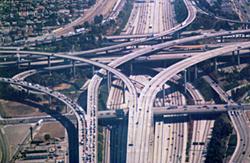The Bank of Israel publishes a new study that indicates an increase in productivity in the industrial sectors as investment in infrastructure such as roads, railways and ports increases

A study conducted by Dr. Ran Shahrabani, from the Bank of Israel's research department, which deals with the impact of infrastructural capital on the industrial sectors, found that the infrastructure capital - which is mainly roads, railways, sea and air ports and communications - increases the productivity of the industrial sectors. A 10 percent increase in infrastructure capital increases productivity, on average, by about 1.25 percent.
The government has an influence on the private market since it determines the level of infrastructure and regulation, in this way it is able to encourage production and improve competitiveness. The more the government invests in infrastructure capital, the more the private market saves costs, this savings is invested in raw materials used in production and as a result industrial productivity increases. According to the research, it turns out that infrastructure capital is a substitute capital for private capital and, to some extent, for labor, a 10 percent increase in infrastructure capital allows the private capital to decrease, on average, by about 4 percent, and the amount of labor - about 0.7 percent.
In the study it was found that yield increases with size in almost all industries. If the government doubles all inputs, the industry's output will more than double. The findings are similar to findings in research works of the branches of industry in similar countries such as the USA, Canada and Australia.
It is worth noting that infrastructure capital serves both other sectors of the economy as well as consumers, so the benefit to the entire economy is much more significant.

4 תגובות
It is obvious. In general when people have a more comfortable life they will also donate more. There will be less resentment and less frustration. It is wrong to look at it in terms of profit and loss. The state needs to economize its steps so that its citizens have the best life possible. The same can be said about education, health, culture, etc... A student who sees that his country invests in higher education and he doesn't need 50 jobs to pay the tuition will stay here and not move abroad.
And with my people, a public figure should not do things just to gain power, to win the next election. And the common man should also have a more long-term view.
The question is also which infrastructures are involved. I'm sure that investing in a normal train is better than roads, which cause more pollution, more noise, and ultimately less financial savings. Have you ever thought how much fuel is burned on our loading in traffic jams? We need to create an alternative and efficient transportation system
Brazil, for example, could be one of the largest exporters of agricultural products in the world, but infrastructure problems such as poor quality roads, a lack of ports, a small truck fleet and other problems do not allow the country to utilize its full potential.
The information is known to the decision makers, and every year the US Department of Agriculture states it in its reports, but as said, politics plays an important role in the economy.
Yes. It may sound trivial and understandable, but it is not. Certainly not in a country where the effectiveness of a project is calculated according to the electoral power it gives to this or that candidate. In such a country, the effectiveness of an investment should be realized during a term and preferably near its end - so that the public can feel it exactly when they vomit (or vomit) their ballot.
I don't understand economics and I haven't read the above report, but I hope that, with the exception of self-evident scientific truths like the one written above, there are also efficiency calculations. Investing in infrastructure 2 times can be effective. What about investing ten times? It's already less effective , no? Maybe not.
I hope that the right people will read and understand what I didn't read and didn't understand and will know how to use it for national well-being in particular and human well-being in general.
Viva la revolution,
Ami Bachar